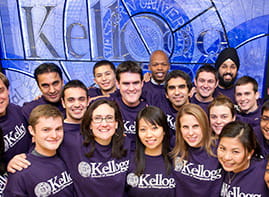At the Kellogg School’s India Business Conference, experts assess opportunities in the fast-growing market
4/23/2009 - Social responsibility can go hand in hand with profitability in India, business leaders affirmed April 18 at the 2009 Kellogg India Business Conference.
The conference, themed “Riding the Elephant: Sharing India’s Success,” brought Kellogg students and faculty together with Indian business experts to discuss opportunities and trends in the subcontinent, one of the brighter spots in a slowing global economy.
Keynote speaker C. K. Prahalad emphasized that creativity, persistence, and flexibility are necessary to succeed in India, adding that great opportunity awaits. A management consultant and University of Michigan professor of corporate strategy, Prahalad shared his vision for India in 2022, foreseeing growth in industry and commerce and innovating from the “bottom of the pyramid.”
Efforts to improve the quality of life in India, such as expanding access to superior health care and education, can be good business rather than simply charity, Prahalad explained. He pointed out that cell-phone purchasing by poor Indians has helped to create the world’s fastest-growing cell phone market. “What if we did the same thing with health care that we have done with connectivity?” he challenged.
For India to reach its potential, the nation must innovate, identify new business models, and demonstrate “moral leadership” in addition to economic strength and technological vitality, Prahalad said. “This is one of the most exciting opportunities all of us have — to see the transformation of one of the (world’s) most vibrant, democratic societies,” he said.
Other presenters emphasized the value of inclusive growth. Amit Mital, corporate vice president of Microsoft’s Unlimited Potential Group, described his company’s efforts to bring technology to people around the world, “enabling sustained social and economic development.” Mital explained the importance of understanding local needs and opportunities and not only creating relevant products, but modifying existing products to work in these emerging markets. The goals, which include “transforming education, fostering local innovation, and enabling jobs and opportunities,” emphasize working with local populations, he said.
L N Balaji, president of ITC Infotech (USA), also advocated engaging local people and embracing social responsibility. It is not necessary to abandon value creation in the process, he said. As an example, Balaji described the transformation of ITC Infotech’s paper industry into a more sustainable, competitive business. By involving local farmers, as well as other resources such as technology, the company became a sustainability leader, he said.
“In a sense, it’s all pioneering,” Balaji said during the panel discussion that followed. “You don’t have any model to bank on and check whether you’re on the right track.”
Other presenters included Baba Kalyani, chairman of the Kalyani group of companies and chairman and managing director of Bharat Forge Limited; Kishore Biyani, group CEO of Future Group and managing director of Pantaloon Retail; and Vinod Dasari ’92, director of Ashok Leyland. The conference concluded with closing remarks from Kellogg School Dean Dipak Jain.
The conference attracted students from across the range of Kellogg MBA programs. “It’s a great place to network with the right people and to get a different perspective,” said Part-Time MBA student Antis Thelapilly.
Executive MBA student Madhav Nadendla, meanwhile, was drawn by the event’s high-profile speakers. “There are so many opportunities right now in India,” Nadendla said, adding that the event offered a chance to find out “what’s driving the growth.”






